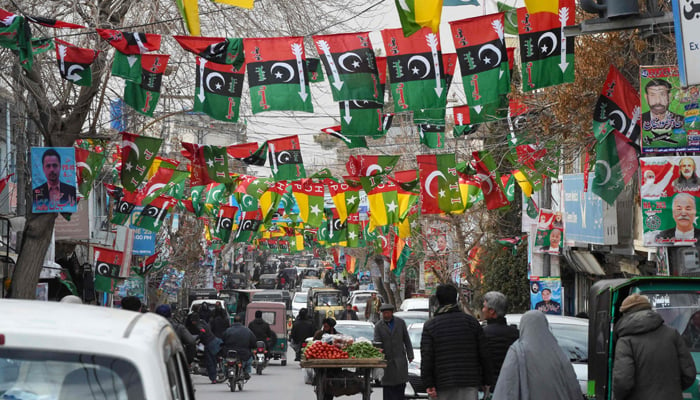Key reasons behind voter choices in Pakistan since 1993
Most voters, who have chosen the PPP since 1993, said that their vote was due to their loyalty to the party
ISLAMABAD: The primary reason why people cast their votes for their favourite political party is to have their government-related issues resolved, such as police and court matters, as revealed by Gallup Pakistan’s book on previous elections since 1993.
Other significant reasons cited by voters included development initiatives, loyalty to respective political parties and the belief that their chosen party is more competent than others. The most common reason given by voters of the PMLN was their desire for development initiatives. The second most cited reason among the PMLN voters was the expectation that their court and police-related issues would be addressed under their preferred political party.
Most voters, who have chosen the PPP since 1993, said that their vote was due to their loyalty to the party. In contrast, the voters who supported the PTI in past elections, said they chose the respective party because they wanted their police and court matters, among other issues, to be resolved.
Gallup’s book on the past 11 general elections of Pakistan reveals that from 1993 till 2018, in the past six elections, the majority of people voted because they wanted their police and court matters resolved and were seeking representation from the elected leader.
Furthermore, 21 percent of the total participants in the past six elections said they voted because they wanted their government-related matters resolved under their chosen political parties. Whereas 19 percent of the total voters said they voted for their preferred candidate because they sought development work in their respective areas and throughout the country.
Moreover, 16 percent of the total voters cast their votes out of loyalty to their political parties, making it the third most common reason for voting.
Thirteen percent of the total voters in the last six elections believed their chosen political party to be more competent than others. Similarly, another 13 percent of the public mentioned they chose their political party based on religious beliefs and honesty. Eight percent of the voters cast their votes due to personal relations with the candidate from their community.
Two percent of the people voted for their preferred party because they wanted another party to lose. Four percent of the voters cited other reasons, while three percent stated they didn’t know why they chose any political party.
-
 Trump Announces A Rise In Global Tariffs To 15% In Response To Court Ruling, As Trade Tensions Intensify
Trump Announces A Rise In Global Tariffs To 15% In Response To Court Ruling, As Trade Tensions Intensify -
 Chappell Roan Explains Fame's Effect On Mental Health: 'I Might Quit'
Chappell Roan Explains Fame's Effect On Mental Health: 'I Might Quit' -
 AI Processes Medical Data Faster Than Human Teams, Research Finds
AI Processes Medical Data Faster Than Human Teams, Research Finds -
 Sarah Ferguson’s Friend Exposes How She’s Been Since Andrew Mountbatten-Windsor’s Release
Sarah Ferguson’s Friend Exposes How She’s Been Since Andrew Mountbatten-Windsor’s Release -
 Jelly Roll Explains Living With 'severe Depression'
Jelly Roll Explains Living With 'severe Depression' -
 Charli XCX Applauds Dave Grohl’s 'abstract' Spin On Viral ‘Apple’ Dance
Charli XCX Applauds Dave Grohl’s 'abstract' Spin On Viral ‘Apple’ Dance -
 Anna Sawai Opens Up On Portraying Yoko Ono In Beatles Film Series
Anna Sawai Opens Up On Portraying Yoko Ono In Beatles Film Series -
 Eric Dane's Wife Rebecca Gayheart Shares Family Memories Of Late Actor After ALS Death
Eric Dane's Wife Rebecca Gayheart Shares Family Memories Of Late Actor After ALS Death -
 Palace Wants To ‘draw A Line’ Under Andrew Issue: ‘Tried And Convicted’
Palace Wants To ‘draw A Line’ Under Andrew Issue: ‘Tried And Convicted’ -
 Eric Dane's Girlfriend Janell Shirtcliff Pays Him Emotional Tribute After ALS Death
Eric Dane's Girlfriend Janell Shirtcliff Pays Him Emotional Tribute After ALS Death -
 King Charles Faces ‘stuff Of The Nightmares’ Over Jarring Issue
King Charles Faces ‘stuff Of The Nightmares’ Over Jarring Issue -
 Sarah Ferguson Has ‘no Remorse’ Over Jeffrey Epstein Friendship
Sarah Ferguson Has ‘no Remorse’ Over Jeffrey Epstein Friendship -
 A$AP Rocky Throws Rihanna Surprise Birthday Dinner On Turning 38
A$AP Rocky Throws Rihanna Surprise Birthday Dinner On Turning 38 -
 Andrew Jokes In Hold As BAFTA Welcomes Prince William
Andrew Jokes In Hold As BAFTA Welcomes Prince William -
 Sam Levinson Donates $27K To Eric Dane Family Fund After Actor’s Death
Sam Levinson Donates $27K To Eric Dane Family Fund After Actor’s Death -
 Savannah Guthrie Mother Case: Police Block Activist Mom Group Efforts To Search For Missing Nancy Over Permission Row
Savannah Guthrie Mother Case: Police Block Activist Mom Group Efforts To Search For Missing Nancy Over Permission Row




